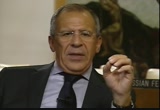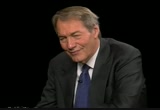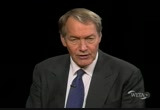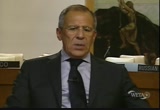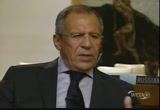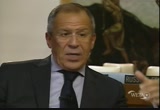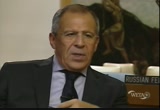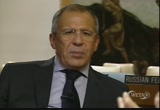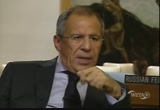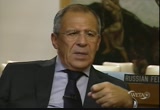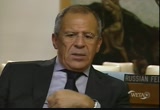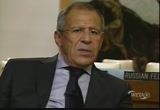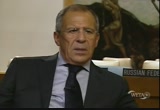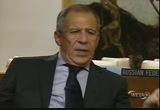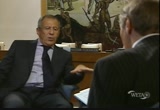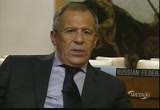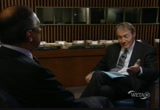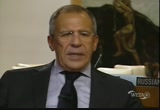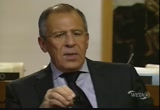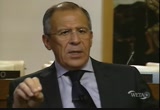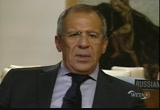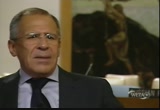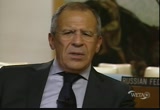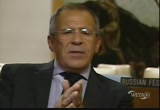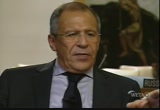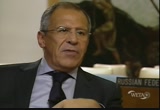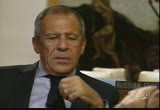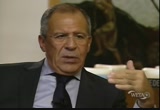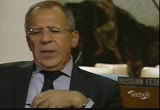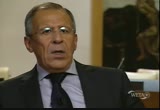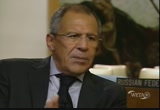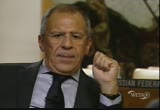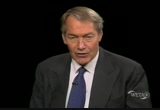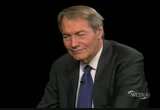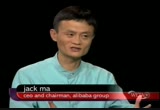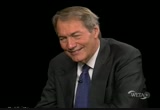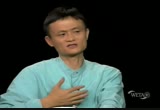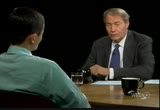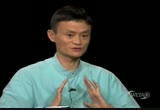tv Charlie Rose PBS September 23, 2010 12:00pm-1:00pm EDT
12:00 pm
important renaissance i would say, and the several summit which is presidents medvedev and obama had clearly established our agenda and last june in washington they agreed that we all must pay much more attention to economy, to economic cooperation, to investment cooperation, innovation projects. and, you know, the economic foundation of our partnership is not very solid. it's about $30 sml a years which which is peanuts compared to what the u.s. has with china, with the european union. but the potential is huge. >> rose: and we conclude with one of the most interesting entrepreneurs in all of china, he is jack ma. his company is alled alibaba. >> core competence of our companies, we have 20,000, grow from 18 people, now 20,000 people. and we focus a lot on the making sure the culture, everybody works for helping others instead
12:01 pm
12:02 pm
captioning sponsored by rose communications from our studios in new york city, this is charlie rose. >> rose: president obama came to office promising to reset relations with russia. he and russian president dmitry medvedev appeared to form a personal bond. they have since signed a nuclear arms reduction treaty-- now waiting to be ratified by the u.s. senate. russia, a long-time ally of iran voted for a fourth round of sanctions last june. russia is today talking about economic cooperation, innovation and building partnerships.
12:03 pm
the face of russia's foreign policy is sergey lavrov. he has been foreign minister since 2004. before that he was russia's ambassador to the united nations. i spoke with him earlier today in the security council chamber at the u.n. here is that conversation. welcome. >> thank you. nice to be here, mr. rose. >> rose: you wrote a piece in "russian global affairs" in july 2010, sort of outlining how you saw sort of the new world order, to use a high faluting word. tell me what forces are at work and how does russia adjust to them? >> well, certainly i believe we would all agree that the world is changing. it's not only globalizing but becoming more and more competitive. new centers of economic power, financial power appear and certainly with economic and financial might comes political
12:04 pm
influence. and that's what we call multipolarity in progress and that certainly must be taken into account by all series foreign policy planners. the united states, i think, under the obama administration understands much better need to build coalition which was already evident during the bush administration time, but the obama foreign policy said very clearly that it must be multilateral i it must take into account the existence of problems with which the united states with all of its assets. >> rose: does that offer opportunities for the united states and russia to cooperate in ways that it has not before? >> i think it does. and not only for the united states and russia but also for europe because the competition which we now witness in the world, it's an objective fact, you know.
12:05 pm
the desire to sell more goods, services, high tech products, intellectual products is measurable and the powerhouse of the world is moving to asia and the pacific. this is recognized by all available statistical data. but it's also civilization. the competition enters into the value. the values promoted by the western civilization are not accepted without question by others the asian civilization, latin civilization, african civilization. so we've had some common denominator in the form of the universal declaration of human rights. basic rights have been formulated. but as soon as you start going into the details, deciphering each and every principle which has been universally endorsed,
12:06 pm
you get into some interesting discussions. and i wanted to explain in that article which you referred to that european union, russia, the united states are three branches of the same european civilization which at some point started spreading to the west by those who left for some adventures in north america and to the east by those whose adventure was to colonize huge siberian space. and if you go to... from, say, london or paris or rome, if you go... or berlin, if you go to san francisco you'll find the same comfortable surrounding but by the same token if you go to
12:07 pm
vladivostok, you feel comfortable again. it's the same civilizational setup. and i think it would be very important to keep this historical heritage of the european civilization and to see whether we can cooperate closer in this triangle in order to use more effectiveedly comparative advantage of this civilization vis-a-vis our relationship which much not be confrontational with other civilizations. the competition should not be equal to competition. >> rose: we're not looking at a conflict of civilizations here. >> absolutely. >> rose: but you seem to be saying russia knows where it is on the map and it knows its heritage and it know it is european heritage and that russia is european and it's casting its... what? what? >> you know, russia benefited from european experience and
12:08 pm
europe benefited from the russian experience many "new york times" history. the first modernization project, i think, could be attributed to the fish yaive the of peter the great who in the early 18th century decided to modernize russia along the european standards because otherwise he believed russia would be lagging behind. and not only by the concept of that reform by peter the great but also by the people who executed this inside russia-- the germans, dutch, other europeans. it was not a russian, it was a european project. we paid huge price for this because we had to overcome terrible resistance. and he would... he was quite a ruthless ruler. but he understood by his
12:09 pm
instinct, by his historic vision that we must modernize otherwise we would be lagging behind and somebody else would modernize us. so it's not for the first time that we would do this. and the great russian literature of the 19th century was moderate to a large extent by this european culture which peter the great imposed upon russia. but then russia paid back. russia paid back by not allowing napoleon to forcefully unite europe in early 19th century. and russia paid back by sharing this culture which was blooming with european intimates. so this european enrichment has always been present in russian/european relations. and after the end of cold war, i think we have the best
12:10 pm
opportunity ever to develop this mutual partnership. >> rose: because when the obama administration came in, the operative word was "reset." what's been reset? >> i believe it was a very courageous decision by president obama who decided to reset... as far as we are concerned he did reset the american policy vis-a-vis russia. we never changed our desire to be friends with the united states. is president putin at that time, at the time of 9/11 tragedy was the first one to call president bush and extend his hand of friendship and help and he was instrumental in arranging logistical support for the united states to throw away al qaeda and afghanistan. and we were as open as we could
12:11 pm
be and we frankly sensed at that time that president bush was responsive, but somehow the chemistry which existed at the level of the leaders did not translate top the working level. and that certain... at a certain point we basically were thrown back to the times of... not cold war but i would say misunderstanding. >> rose: so it's much better under president bush today in terms of understanding each other and the relationship and the initiatives taken by the obama administration insqluding nuclear nonproliferation and the start treaty and all that? >> i think so. including the modification of the missile defense plan. but the main thing, it's not about... it's not only about one or another big problem on the agenda of russian/american relations. it's also about how you do
12:12 pm
business. during the bush administration, especially last administration, we sensed lack of consistency. you discuss something, you agree on something and then you don't see your partner to deliver. >> rose: is it possible there was a division in the bush administration? >> i don't know. i think there were people who were not interested in improving relations with russia. i don't have any reason to question the sincerity of president bush himself. >> rose: but you're convinced that secretary clinton wants to improve relations and is on a course to do do that? >> absolutely. just like i'm convinced president obama is on the same course. >> rose: so does the rubber meet the ground in iran? is that where the relationship might be tested? >> well, i think they have been tested for quite some time. and the fact that we managed during all these years in spite of very serious nuances-- let me put it mildly-- in our oppositions, but we managed to stick together not only russia
12:13 pm
and the united states but also the european union, china, it speaks of its. it's a partnership which is based on the common desire, common determination not to allow any violation of nonproliferation regime as far as nuclear weaponss are concerned. but at the same time, it's a partnership based on the clear understanding, clear commitment that we not only exert pressure, and that we exert pressure not for the sake of exerting pressure but we do this to induce iran to engage with us in a dialogue which is meaningful, which is addressing all the key issues, which would at the end of the day leave no doubt regarding what the nuclear program of iran is about. >> rose: do you have any doubt about what the nuclear program of iran is about? >> yes. we want to be very clear that it is entirely peaceful.
12:14 pm
and if this is the case, russia, e.u., the united states and china agreed and told the iranians so that if this is the case, if we have verified, and if we have established that the iranian nuclear program is entirely peaceful, sanctions would be over and you would enjoy this... the same rights as any non-nuclear member. meaning that you can produce uranium and cooperate in developing nuclear energy but of course you cannot have any weapon-grade uranium and any... >> rose: does your government have an opinion as to whether iran wants either nuclear weapons or the capacity to have nuclear weapons? >> it's not a matter of wanting or not wanting the xaszty you require when you have full
12:15 pm
nuclear fuel cells, which is not prohibited urn non-proliferation treaty. >> rose: and know how. >> well, when you have the nuclear fugue cycle, technology, the weapon grade uranium is produced by just increasing the skill of centrifuges. but we have no evidence that iran wants to have a bomb. we have no evidence this that iran has taken the political decision to go into weapons-grade uranium enrichment. we have full conviction that iran wants to have a nuclear fuel cycle which, again, is not prohibited by n.p.t. but this must be very well understand that iran is a country in relation to nuclear program of this country, there are suspicions and these suspicions must be fully removed. and that's what we're trying to do in this three-plus-three group.
12:16 pm
>> rose: at what point would the russian government say diplomacy hasn't worked, sanctions haven't worked and it's unacceptable for iran to have nuclear weapons and therefore military action may be necessary"? >> well, if those threats which we hear from time to time from several quarters are materialized and forces used against iran, i believe this would be the shortest way to the radicals in iran prevailing and deciding that now that we were struck we must have nuclear weapons. so striking iran, in my view, would be the shortest way to inducing the iranians going nuclear. militarily. >> rose: but under no circumstances in which you think military action would be wise. >> no. i think it would be... >> rose: the only option? >> i think this region is so
12:17 pm
fragile. i think this region is overburdened with so many problems, two flaming conflicts in iraq and afghanistan. non-resolved palestinian/israeli conflict. syria, lebanon. the issue of... which was just endorsed by the united nations and nonproliferation treaty review conference. namely that we must move forward to create zones free from weapons of mass destruction. it's all interrelated and if forces used against the a country like iran the consequences, i don't even want to discuss it because i hope that reason would prevail and that the people who have this idea would not be prevailing. >> rose: the bbc reported that a deal for russians to sell defense missile was... had been canceled.
12:18 pm
and does that say something about how you view the iranians? >> we have a complex relationship with iran. it's our great neighbor, we have centuries of relationship. we have very many things which unite us, including trade, economic ties, energy projects, caspian sea. and iran is a very old civilization. it's a very rich culture and we have cultural exchanges for centuries. so the links, mutual links are very well rooted and very well established. and we want iran to be a stable country to be our good neighbor and to be a member of the international community. >> rose: but you're also prepared to vote for in the security council sanctions against iran. >> yes. because i wanted to follow up by
12:19 pm
saying that we cannot tolerate violations of nonproliferation treaty. we want to understand what xa what exactly was happening during those 18 years of secret nuclear program in iran when iran did not report what it should have reported to the i.a.e.a. some important issues remain and we want iran to cooperate. we don't support iran in ignoring the agency's request. we believe iran should be much more forthcoming because we want iran to remove this burden of suspicion and become equal and constructive member of the regional dialogue because iran has leverage on many regional situations. iraq, afghanistan, palestine, syria, lebanon. and beyond. >> rose: and how is it using that leverage in your judgment?
12:20 pm
>> i don't think it's using it to the full extent possible but i also think that the three plus three group three years ago when we presented our offer to iran we included deliberately a section which said we also want to cooperate with iran on regional issues. what we meant was the need to recognize iran's interest in the region and without giving iran any preferences compared to other countries to allow iran to participate on equal footing with others in regional discussions and then convinced iran wants it. and if we all are reasonable and if we all recognize that there are security interests of iran just like there are security interests of other countries in the region, if we recognize that iran must cooperate, we fully remove any reasonable doubt, any doubt at all regarding its
12:21 pm
nuclear program. and if we engage iran on these grounds, if we develop a package which would oblige iran to do what we all wanted to do, at the same time which would oblige us to accept iran as an equal partner in regional issues, i think would be the best solution. and by the way, i know that president obama for the second time recently again indicated his desire to engage with iran. and i hope this would be third and i hope this would be followed up, at least a meet that we had in new york with the three plus three group indicates there is a very strong desire while using the pressure on iran but also a desire to engage iran and we will do this we will try to explain to iranians that this is first of all in their own interests to engage and cooperate on the international community on the basis of what
12:22 pm
the i.a.e.a. wants and the basis of the security council. >> rose: you spend a lot more time thinking about economic issues than you ever have in the past? >> well, you have to because economy is influencing diplomacy much more than before. >> rose: and gives china increasing leverage and india around the world. >> as i said at the beginning of the discussion, it can only grow financial power, political influence. >> doctor r there misconceptions that americans or even american leaders have about russia today and the nature of russia's intent for russia today? >> well, i think that theoretically speaking in any country you would find parts of the establishment which would be suspicious or misunderstanding, vis-a-vis another country. i feel in my context with the
12:23 pm
people in the united states with whom i communicate and those are not only secretary of state, other ministers, not only state department officials, not only journalists, the business community representatives but also just people whom i know for many years, i feel that the overwhelming mood is in favor of removing ideological inhibitions and ideological cliches. is because russians and the americans have very much in common as far as the attitude towards life is concerned. >> rose: what do you mean by that? >> well, you want to have interesting jobs. we do the same. superintendent these jobs to be well paid. and the same is true with us. you love art. you love culture. >> rose: care about the education of your children and the development of your... >> absolutely. and, you know, spend a weekend
12:24 pm
nighting with your friends chatting away with a glass of beer or wine, going to countryside, have barbecues. >> rose: so therefore... >> revel and see places. >> rose: so there ought to be a lot of things that these two countries-- the united states and russia-- can come to further understanding and mutual purpose and exercising the combined power of the two. >> rose: i was certainly enjoying russian/american relations. we envoy a period of very important renaissance, i would say, and the several summit which is presidents medvedev and obama had clearly established our agenda and last june in washington they agreed that we all must pay much more attention to economy, to economic cooperation, to investment cooperation, innovation projects. and the economic foundation of our partnership is not very
12:25 pm
solid. it's about $30 something billion a year, which is peanuts compared to what u.s. has with china, with the european union. but the potential is huge. and the fact that the two presidents send a very strong political message to the business communities that they support the direct links is already working and like a number of promising high tech energy projects are being discussed and developed. >> rose: does the prime minister of russia, mr. putin, and the president of russia, mr. medvedev, see russia's interest the same? are they on the same page both in terms of how they see change and where they see russia going? >> absolutely, absolutely. >> rose: one's not a hard-liner, one's not a soft liner. wasn't doesn't use certain kind of leverage. how do we understand these two? >> the people who want to
12:26 pm
distinguish between medvedev and putin and the terms of who is hard-liner, who is soft liner, they are very simplistic, i would say. president medvedev took the toughest decision for any president, to use military force abroad, to repel the georgian aggression against the russian peacekeepers in violation of the international agreements with georgia signed and it's not an easy thing to do. >> rose: and he had the full backing of his foreign minister and his president and prime minister. >> president medvedev also took a decision when he understood that this was the only way to protect the survival of people to recognize the independence of those two places. it is not something which a softy would do. and at the same time, president putin who is considered to be a hard-liner... well >> well, and a former k.g.b.
12:27 pm
official. >> was very instrumental in helping the united states to get the logistical infrastructure around afghanistan to prepare for the operation against international terrorism. and president putin was the one who promoted very far going, far-reaching projects which unfortunately were not picked up by the bush administration, including on the missile defense >> you sent signals to the bush administration that they didn't respond to? >> on quite a number of things. and it's very schematic and simplistic to distinguish between who is a softy and who is a hard-liner. >> rose: who's a tough guy and who's not. who's ruthless and who's not. >> the rulgts relationship promotes the policy which
12:28 pm
reflects the attitude of russia on one stage of historic development or another when in the middle of... in the first half of this, the attitude towards russia changed. it was for no good reason. >> how did it change? >> it changed... i will tell you when and how. time wise it changed with the expansion of the european union and nato. and when the new members were admitted, we were told by all europeans and the americans don't you worry, they have their forebearers but when we admit them to nato and the european union that they would feel safe and stop causing trouble. the so it happened. when some of those countries became members of nato and the european union they indeed probably felt safe but they also
12:29 pm
felt free to say all sort of nasty things about russia and to ignite some confrontational attitudes. i had meetings with both european union and the meeting of the nato russia council. the inertia suz s still felt but in much less way. >> rose: you feel less threatened by it? >> me? >> rose: no, russia. >> the forebearer of those newcomers in nato who immediately after jumping into the organizations started pulling the membership against russia. some inertia is still felt but not much. and much less than several years. >> rose: so nato and all of that is less of a problem as it might
12:30 pm
have been earlier? >> nato expansion is absolutely antiquated thinking. nato expansion does not add the security. what we want for your atlantic space is equal security for all countries irrespective of whether they are members of nato or they are members of organization of collective security treaty. and indwizability of security and the principle that no country should expand in security at the expense of the security of others. those were the principles pronounced at the top level in organization of security and cooperation in europe and in meetings between nato and russia in the' 9 90s. it didn't work. it didn't work in the former yugoslavia, it didn't work in georgia two years ago. so we suggested that this statement, statement of
12:31 pm
principle that securities in divisible and no one should expand security at the expense of security of others be made legally binding, that's the essence of president medvedev's initiative which is being discussed. >> and... >> rose: and you see a rens sans in the u.s./russia relationship. that was the word you used. >> yes, it's a rens sans in the sense of an entirely new atmosphere and the feeling that whatever the president's agree, whatever the ministers agree is being followed up and implement >> rose: so what caution do you have for the united states in afghanistan? >> it's not for me to make any advice to the united states. >> rose: is it doable? >> i don't know.
12:32 pm
it's only possible toll say that i think the recent realization that washington that you need to be... you need to involve more regional factors. you need to rely on the neighbors. you need to rely on their knowledge of each other and of afghanistan and it's a very welcome site. >> rose: iran can help in afghanistan if approached the right way? >> absolutely. >> rose: and are prepared to do it based on what you know of your relationship with the iranians? >> and the right way is a very simple way. it's an equal way. it's a way of equality. inviting all neighbors to participate as equals. >> rose: it seems to me you're suggests by that small example that the united states would be a lot better off if it engaged iran more.
12:33 pm
everyone who in the united states would be much better off if it does engage everyone. engagement is the key word for the foreign policy. isolation does not work. look, hamas three years ago, four years ago, i don't remember when winning a fully democratic election and the united states and some europeans saying yes, the elections were very free and fair but we cannot recognize the outcome. let's isolate hamas. so now we have the gaza problem. the same attempt was to isolate hezbollah, though hezbollah is not an important product of the produce of lebanese shi'a. >> rose: but you have influence in lebanon, too. >> well, now the government of prime minister hariri is a coalition government with hezbollah sitting in and lebanon is much better off than if you
12:34 pm
take a course of isolation you don't normally get the better results. >> rose: so how can the united states engage with iran? >> diplomats are paid with this. you have to be creative. >> rose: give them some freed a vice. >> well t united states is very creative in trying to keep in one piece the palestinian negotiations. one piece of that would resolve many problems. >> rose: are you optimistic about the israeli/palestinian at this point? >> i cannot say yes because being optimistic means it depends on you and you would influence things. we are trying to influence things. when negotiations started we all welcomed this.
12:35 pm
and we want negotiations to continue. >> rose: thank you very much. i always look forward to these conversations and i appreciate you taking the time in a very busy day here at the general assembly meeting. >> thank you very much. >> rose: jack ma is here. he's the founder of alibaba, china's largest e-commerce group. he's one of the country's first and most successful technology entrepreneurs. his company owns a host of popular sites including alibaba.com, a trade site for small businesses that has more than 50 million users in more than 240 countries. china's largest retail site, with more than 300 million users and china's version of paypal with more than $400 million users. the company is also eying markets in the united states, japan and india for more growth. alibaba is among china's homegrown tech companies that have flourished in its booming market. china already has the world's
12:36 pm
largest internet population with over 400 million people online. i'm pleased to have jack mat ma at this table. welcome. tell me how you got involved in technology. >> i was trained to be a high school teacher. i know nothing about technology. the only thing i use mid-computer for was to seven e-mail and browse. that's it. >> rose: you can't write code? >> not at all. i'm always wondering how the code works. i respect technology. we always... i believe one thing is technology is for the people. we should tell the technology guy what the consumers want, what the people want. because i believe 80% of the people in this world are like me, we love technology but we're scared of technology.
12:37 pm
>> so what was it about you and creating these companies? >> i started the first company in 1995. i found something is going to change the world so i started the business... >> you knew it was going to change the world and you saw it? >> i think this thing is going to be huge by honestly i do not know that 15 years it would grow that fast. i worked for myself for three years and competed with china and then joined government for 14 miles and then start alibaba. today i think what we want to do the business is that when i was entrepreneur small tiny business nobody helped us. so when we grow we say well china needs a lot of jobs, china needs a lot of entrepreneurs and
12:38 pm
what's the best way to help them? internet. so they will focus on helping each other. and the more people that helped us then the business really grows. >> rose: you are an apostle for small business? >> i'm a strong believer. it's my religion. >> rose: it's your relidge john? >> it's my religion. i think it's a great honor for us that we were born in this stage doing internet and we realized we can help so many people. it's all about family, is it's all about family dreams. so you know, i think i'm very honored that it's just a great honor that this life that you can influence so many families just by using the technology. >> rose: where is alibaba going? >> stay focused on e-commerce and consumer market and i think we become the infrastructure of china e-commerce. you know, dmers the states is a december bert but in china it's
12:39 pm
become a main course. because the infrastructure of doing business in china is so bad. is infrastructure of doing business is in the states is so good so it's very difficult for a pew e-commerce company to grow that big in the states. but in china just like mobile phones. ten, 15 years ago the infrastructure of telecommunication was so bad. today e-commerce, same thing. so i think there's... the best that came into this world is helping make money through the commerce. >> rose: what do you think your core competence is? >> culture. it's not the technology. i think technology is... the core competence of our companies we have 20,000 and we focus a lot on the value in making sure the culture, everybody works for
12:40 pm
helping others instead of just making money, and we believe that's different from wall street. we believe customer number one, employee number two, shareholder three. >> customer one, employee two, shareholder three. >> this is my religion. if you... it's the customer that pays us the money. it's the employees that drive innovation. it's the shareholder... and shareholders say, you know, i'm a member the day before ipy and a lot of people say jack, we're long term shareholders but when a crisis came these guys run. they run away. my people stayed, customers stayed. >> rose: so you've got a world market now. you've got traction, big time traction you can look at the world and say what we do in china we can do anywhere. or not? >> well, yes and no, i think we'd say we're doing china. where there's small and medium size business, yes.
12:41 pm
i'm a strong believer small is beautiful in this century. last century big size, big skill. >> rose: so 21st century small is beautiful? >> small is beautiful. >> so we believe as long as any nation anywhere off small/medium size business they'll be there. >> are there people trying to create... do do you see people in the united states trying to follow your model and do what you're doing? >> they try but not successful. >> rose: why is that? >> i think u.s. is company driven. ten years ago the e-commerce is focused on big company, focused on buyers, focusing on cut the cost (china we focus on small and medium size companies. we focus on supplies. i think you have to teach the s.m.e. how to save the costs. we would help them to sell things but u.s.a., we have over two million registered users, small and medium size individual
12:42 pm
users in the states right now. >> rose: i don't know that this is an analogy or not but sam walton at wal-mart focused on small towns. he built wal-mart by serving people in small towns. not by coming to manhattan or boston or chicago or los angeles. >> i agree with that. i think... i've seen people make a fortune by catching shrimp but i've never seen people make a fortune by catching sharks and whales. like "forrest gump" told me, shrimp this and shrimp that, you have a simple dream. >> rose: (laughs) exactly. so now that you have a very, very prosperous business, enormous wealth fame, what is it you want to do? >> i think the rest of my life is spend more time enencourage entrepreneurship.
12:43 pm
>> it's your religion? >> yes, i want to help more people go back to school. i was trained to be a schoolteacher and i've been doing business for 15 years and i think most of the things i learned from school is not correct. >> what didn't you learn that you wish you had learned? in other words, what are you teaching us that's not correct and what is correct that they're not teaching us? >> well, a lot of business schools on how to make money. i want to tell people if you run business, you have to run the value first. to surf the others, help the others, that's the key. because i... one of the things we believe is if you think about making money and this is the u.s. dollar, talk about hong kong dollars, nobody wants to make friends with these people. thing about how can you help people and create value for the others and then you'll get the money. this is how we succeed in china. and this is why you call us
12:44 pm
believe that. people say jack, your company is crazy. how can you do that. this is the way we run the business. and i think this is the way the 21st century. the other thing is also focused on quality and people. >> rose: say that again? >> your own people. because i think china, the best resource is not... it's the human brain. 1.3 billion people. if we develop their brains, that's got a lot of innovation. that's the best resourcings we could ever have so many young people, the average age of the company is 26 years old. that changed the world. and that brain that's running the computer, i hate xuper running brains. we should make human brains running computers.
12:45 pm
the technology growth maybe 500 and 600 years later, machine's going to kill people. our job is to make sure that a human runs the machine. machines serve the people. so beyond the small business and entrepreneurship and the human brain, what is it that... what is it about the way the world is going that encourages you or worries you? >> i think worries me is about greeting, especially one of the reasons we have the financial crisis is the greed. when you put money first, shareholder one. nation thinks about the g.d.p. and the company thinks about revenue, profit and i.p.o. and the people forgot what they're doing. we're coming here not to make money,dom this not to make money
12:46 pm
we're coming here to experience the life. what would make me excited, i think the young people. the people, these people because of the... >> rose: i believe that? you think they'll return to values because of young them? >> because of young people. young people, my father was criticized my grandfather. my father critized me but my father did a better job than my grandfather, i did a better job than my father and i believe my kids will do a better job than us. nobody can stop it. >> rose: you work all the time or do you take time for balance in your life? if you pause the answer is you have no balance. >> right. that's right. yeah. >> rose: why is that? because it's so exciting? because the challenge is now?
12:47 pm
it's the only life you know? it makes you happy? what? >> i think because of the excitement and because i really treasure and honor this opportunity in my life that i can do things. my father said if you were born 30 years ago, earlier, you would probably be in the prison because the ideas you have are so dangerous. >> rose: if you were born 30 years ago you'd be in prison? >> before the cultural revolution, i would be in prison. because the way you think is so rick did louk. >> rose: what are the ideas that excite you or is it just customers? >> customers first second is last century, a company if you want to grow i believe you should find a good opportunity. today if you want to be great company, think about what social problem you can solve. it's not not to catch the opportunity, it's about solving socialist problems because a
12:48 pm
company like alibaba, it's very difficult for one opportunity that can make us last such organizations powered by internet, what kind of problem can be solved? and anything you mention about cloud computing and talking about mobile things, anything that's happened in the u.s.a. is going to happen in china. >> will we continue to lead that technological revolution? >> you mean states? >> yes. >> yes and no. >> >> because you have smart people that have more education now. you develop... china is educating every year by a factor of 100 x, number of computer scientists and engineers, people who can create with the right kind of investment, innovation, philosophy and creativity. the solutions to the technology
12:49 pm
issues >> yeah, i think china... the u.s. doesn't have to worry about it. i think u.s.a. technology will take the leadership. but a lot of things will ship to china not because... not because china has more smart people, i think u.s.a. also has a lot smart people. but the china market is big. 1.3 billion people. the market drives the technology. >> rose: if there's a demand, you will have... >> a huge demand. >> you'll have the incentive to create new solutions? >> yes, yes. >> rose: new way to solve people's problems? >> exactly. exactly. so i think u.s.a. should be optimistic that are more open to china's market because 1.3 billion people that's not china market, it's a global market. and china should look at the u.s. also, say this is the passion, it's the system. it's the culture so it still takes a long time for china to catch up with technology is easy
12:50 pm
now catch up with the qul which you are, the innovation, the system takes some time. >> rose: and where will that come? >> 20, 30 years at least. >> rose: who do you most admire in terms of... in your field? i mean, you once said if alibaba cannot become a microsoft or wal-mart i will regret it for the rest of my life. >> yes, we should surpass microsoft and wal-mart. it's not because alibaba is great. because this is our generation. this generation of business leader, it's our mission to do better than the last generation. so i will regret if we cannot do better than wal-mart because wal-mart created a wonderful business model that created such a b to c model. they created the largest skill assembly line. but alibaba can create c-to-b. consumer to business. because of consumer needs, the
12:51 pm
business changes their lives. so i think this should give us young people the opportunity to change the world. to improve the world. you know, that's... we have to, i mean, there's no excuse. we cannot do it. we have to do it. our fore fathers already invested so much on education and it's our time to prove it. >> rose: bill gates and warren buffett went to china recently to talk about their giving pledge, the idea that people like yourself become very, very rich and will think about at some point giving up to 50% of that money away. what do you think of that idea? how do you think the response will be in china? >> okay. i think it causes a lot of debates right now in china but my thinking is that first, to me i never thought the money i have belongs to me. it belongs to society. we have a couple of million,
12:52 pm
you're a rich guy. we have ten to 20 million, it's a capital. we have over a hundred million, that's the social resources. that's the society give it to you, you guys run. so it's not my money. i don't think i can i mean, what what's money for? >> rose: not going to be happy on a yacht in the riviera. >> i think today what china needs is 200 million jobs. we are a country like... >> rose: 200 million jobs. >> we have 1.3 billion people, urbanization, and we need a lot of jobs. a lot of people created jobs. so today china and whatever, i respect. but people like us, we should use resources that's one of the money that i think we can run
12:53 pm
the sources better than the government. so by supporting the society i don't think... i will regret when i'm 80 years old, 70 years old, instead of donating money, i should spend the money now. >> rose: and create jobs? >> yes. create hope. >> rose: you believe that in terms of social good, the best thing you can do is create jobs because if you have a society in which people have a job and they have a respectable way to earn a living and provide shelter and to provide a means for their children to have a better life, as you said, your father didn't and your grandfather and you did than your father. >> and the other thing is environmental protection. china, you know,fy lost two great young people last year because of cancer. they're only 20s. they have a lot of friends, they have a friends, relative, everybody cancer. everybody says yes. >> rose: environmental? >> environment. the water is polluted, the trees. the whole thing.
12:54 pm
so we think this is what... it can be another religion. if we grow our business but we've got to care for the environment, we're killing our kids or killing our own future. so this is... this thing is militia important today in china than just giving money to somebody and other things. so it's not 50%, why not 90%? >> rose: why did you call the company alibaba? >> i like the spelling and i like that vision alibaba open sesame. i believe the internet is open sesame and there's a password that everybody to that you can find great people, you can find great opportunities of business and improve people. that's open sesame story. i love the alibaba. it saves me a lot of marketing dollars.
12:55 pm
107 Views
IN COLLECTIONS
WETA (PBS) Television Archive
Television Archive  Television Archive News Search Service
Television Archive News Search Service 
Uploaded by TV Archive on

 Live Music Archive
Live Music Archive Librivox Free Audio
Librivox Free Audio Metropolitan Museum
Metropolitan Museum Cleveland Museum of Art
Cleveland Museum of Art Internet Arcade
Internet Arcade Console Living Room
Console Living Room Books to Borrow
Books to Borrow Open Library
Open Library TV News
TV News Understanding 9/11
Understanding 9/11